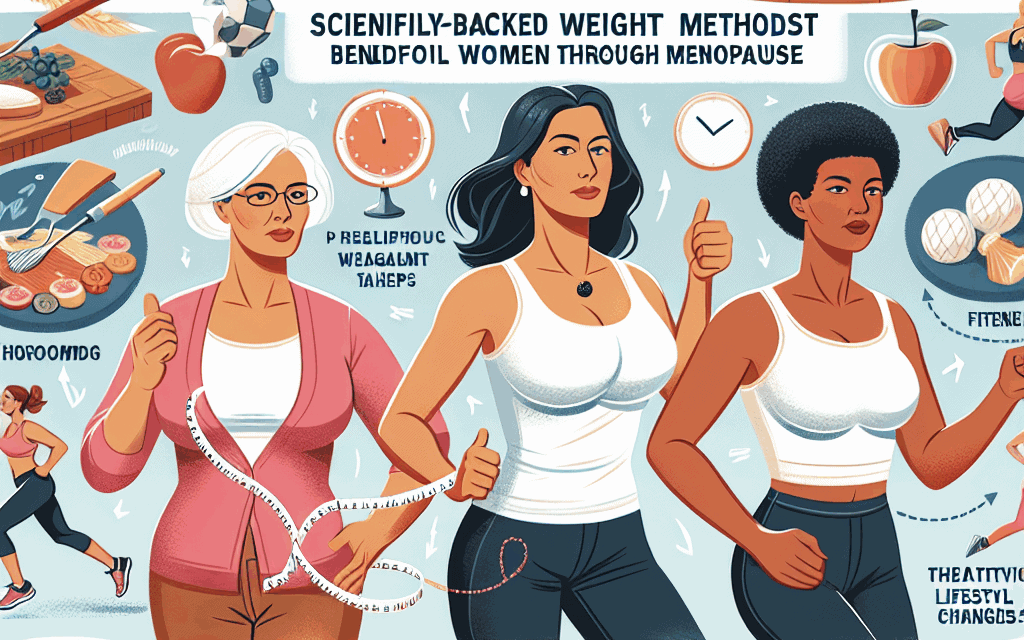Effective Weight Management Approaches for Menopausal Women
Menopause is a natural biological process that marks the end of a woman’s reproductive years, typically occurring between the ages of 45 and 55. While it is a significant transition, it often comes with various physical and emotional changes, including weight gain. Understanding effective weight management strategies during this phase is crucial for maintaining overall health and well-being. This article explores five key approaches to weight management for menopausal women, providing insights, strategies, and practical tips.
Understanding Menopause and Its Impact on Weight
Menopause is characterized by hormonal changes, particularly a decrease in estrogen levels. This hormonal shift can lead to various physiological changes that affect body weight and composition. Understanding these changes is essential for developing effective weight management strategies.
During menopause, women may experience:
- Increased Fat Storage: Lower estrogen levels can lead to an increase in visceral fat, which is fat stored around the abdomen. This type of fat is associated with higher risks of cardiovascular diseases and metabolic disorders.
- Muscle Mass Loss: Aging and hormonal changes can lead to a decrease in muscle mass, which in turn lowers the basal metabolic rate (BMR). A lower BMR means fewer calories are burned at rest, making weight management more challenging.
- Changes in Appetite: Hormonal fluctuations can also affect appetite regulation, leading to increased cravings for high-calorie foods, particularly those rich in sugar and fat.
- Emotional Factors: Menopause can bring about mood swings, anxiety, and depression, which may lead to emotional eating as a coping mechanism.
Research indicates that many women gain an average of 5 to 10 pounds during menopause, but this can vary widely. Understanding these changes is the first step in developing effective weight management strategies tailored to menopausal women.
Nutrition: The Foundation of Weight Management
Nutrition plays a pivotal role in weight management, especially during menopause. A balanced diet can help mitigate some of the adverse effects of hormonal changes and support overall health.
Key nutritional strategies include:
- Focus on Whole Foods: Incorporating whole foods such as fruits, vegetables, whole grains, lean proteins, and healthy fats can provide essential nutrients while keeping calorie intake in check. These foods are often lower in calories and higher in fiber, which can help with satiety.
- Monitor Portion Sizes: As metabolism slows, portion control becomes increasingly important. Using smaller plates, measuring servings, and being mindful of hunger cues can help prevent overeating.
- Limit Processed Foods: Processed foods are often high in added sugars, unhealthy fats, and empty calories. Reducing these foods can help manage weight and improve overall health.
- Stay Hydrated: Drinking plenty of water can help control hunger and support metabolic processes. Sometimes, thirst can be mistaken for hunger, leading to unnecessary snacking.
- Consider Nutritional Supplements: Some women may benefit from supplements such as calcium and vitamin D to support bone health, especially as the risk of osteoporosis increases post-menopause.
For example, a study published in the journal “Menopause” found that women who followed a Mediterranean diet, rich in fruits, vegetables, whole grains, and healthy fats, experienced less weight gain during menopause compared to those who did not. This diet not only supports weight management but also promotes heart health, which is crucial during this life stage.
Physical Activity: Moving Towards a Healthier Weight
Regular physical activity is essential for weight management, particularly during menopause. Exercise helps counteract muscle loss, boosts metabolism, and improves mood, making it a vital component of a comprehensive weight management plan.
Effective exercise strategies include:
- Strength Training: Incorporating strength training exercises at least two days a week can help build and maintain muscle mass. This is crucial for increasing BMR and improving body composition. Exercises such as weight lifting, resistance band workouts, and bodyweight exercises (like squats and push-ups) are effective.
- Aerobic Exercise: Engaging in moderate-intensity aerobic activities, such as brisk walking, cycling, or swimming, for at least 150 minutes per week can help burn calories and improve cardiovascular health.
- Flexibility and Balance Training: Activities like yoga and Pilates can enhance flexibility, balance, and core strength, reducing the risk of falls and injuries, which is particularly important as women age.
- Incorporate Movement into Daily Life: Finding ways to be active throughout the day, such as taking the stairs instead of the elevator, walking during lunch breaks, or engaging in active hobbies, can contribute to overall physical activity levels.
A study published in the “Journal of Physical Activity and Health” found that menopausal women who engaged in regular physical activity were less likely to gain weight compared to those who were sedentary. Additionally, exercise has been shown to improve mood and reduce symptoms of anxiety and depression, which can be particularly beneficial during menopause.
Behavioral Strategies: Mindful Eating and Lifestyle Changes
Behavioral strategies are crucial for sustainable weight management. Mindful eating and lifestyle changes can help women develop a healthier relationship with food and their bodies.
Key behavioral strategies include:
- Mindful Eating: Practicing mindful eating involves paying attention to hunger and fullness cues, savoring each bite, and reducing distractions during meals. This approach can help prevent overeating and promote a healthier relationship with food.
- Set Realistic Goals: Setting achievable weight loss or maintenance goals can help women stay motivated. Instead of aiming for drastic weight loss, focusing on small, sustainable changes can lead to long-term success.
- Keep a Food Journal: Tracking food intake can help identify patterns and triggers for overeating. A food journal can also increase accountability and awareness of portion sizes.
- Seek Support: Joining a support group or working with a registered dietitian or health coach can provide guidance, motivation, and accountability. Sharing experiences with others can also reduce feelings of isolation.
- Manage Stress: Stress can lead to emotional eating and weight gain. Incorporating stress management techniques such as meditation, deep breathing exercises, or engaging in hobbies can help mitigate stress-related eating.
Research published in the “American Journal of Clinical Nutrition” found that women who practiced mindful eating techniques experienced greater weight loss and improved dietary habits compared to those who did not. By focusing on the psychological aspects of eating, women can develop healthier habits that support weight management.
Hormonal Therapies and Medical Interventions
For some women, hormonal changes during menopause can lead to significant weight gain and other health issues. In such cases, hormonal therapies and medical interventions may be considered as part of a comprehensive weight management plan.
Options include:
- Hormone Replacement Therapy (HRT): HRT can help alleviate menopausal symptoms and may also assist in weight management by stabilizing hormone levels. However, it is essential to discuss the risks and benefits with a healthcare provider, as HRT is not suitable for everyone.
- Medications for Weight Management: Certain medications may be prescribed to assist with weight loss. These medications work by suppressing appetite or increasing feelings of fullness. Again, it is crucial to consult with a healthcare provider to determine the best options.
- Regular Health Check-ups: Regular check-ups with a healthcare provider can help monitor weight, assess metabolic health, and identify any underlying conditions that may affect weight management.
- Personalized Health Plans: Working with healthcare professionals to develop personalized health plans that consider individual health needs, lifestyle, and preferences can lead to more effective weight management strategies.
A study published in the “Journal of Clinical Endocrinology & Metabolism” found that women who underwent HRT experienced less weight gain compared to those who did not. However, the decision to pursue HRT should be made on an individual basis, considering personal health history and preferences.
Conclusion: Embracing a Holistic Approach to Weight Management
Weight management during menopause can be challenging due to hormonal changes, lifestyle factors, and emotional well-being. However, by adopting a holistic approach that includes nutrition, physical activity, behavioral strategies, and medical interventions when necessary, menopausal women can effectively manage their weight and improve their overall health.
Key takeaways include:
- Understanding the physiological changes during menopause is crucial for developing effective weight management strategies.
- A balanced diet rich in whole foods, portion control, and hydration can support weight management.
- Regular physical activity, including strength training and aerobic exercise, is essential for maintaining muscle mass and boosting metabolism.
- Behavioral strategies such as mindful eating, goal setting, and stress management can enhance weight management efforts.
- Consulting with healthcare providers about hormonal therapies and medical interventions can provide additional support for weight management.
By embracing these strategies, menopausal women can navigate this transitional phase with confidence, promoting not only weight management but also overall health and well-being.





